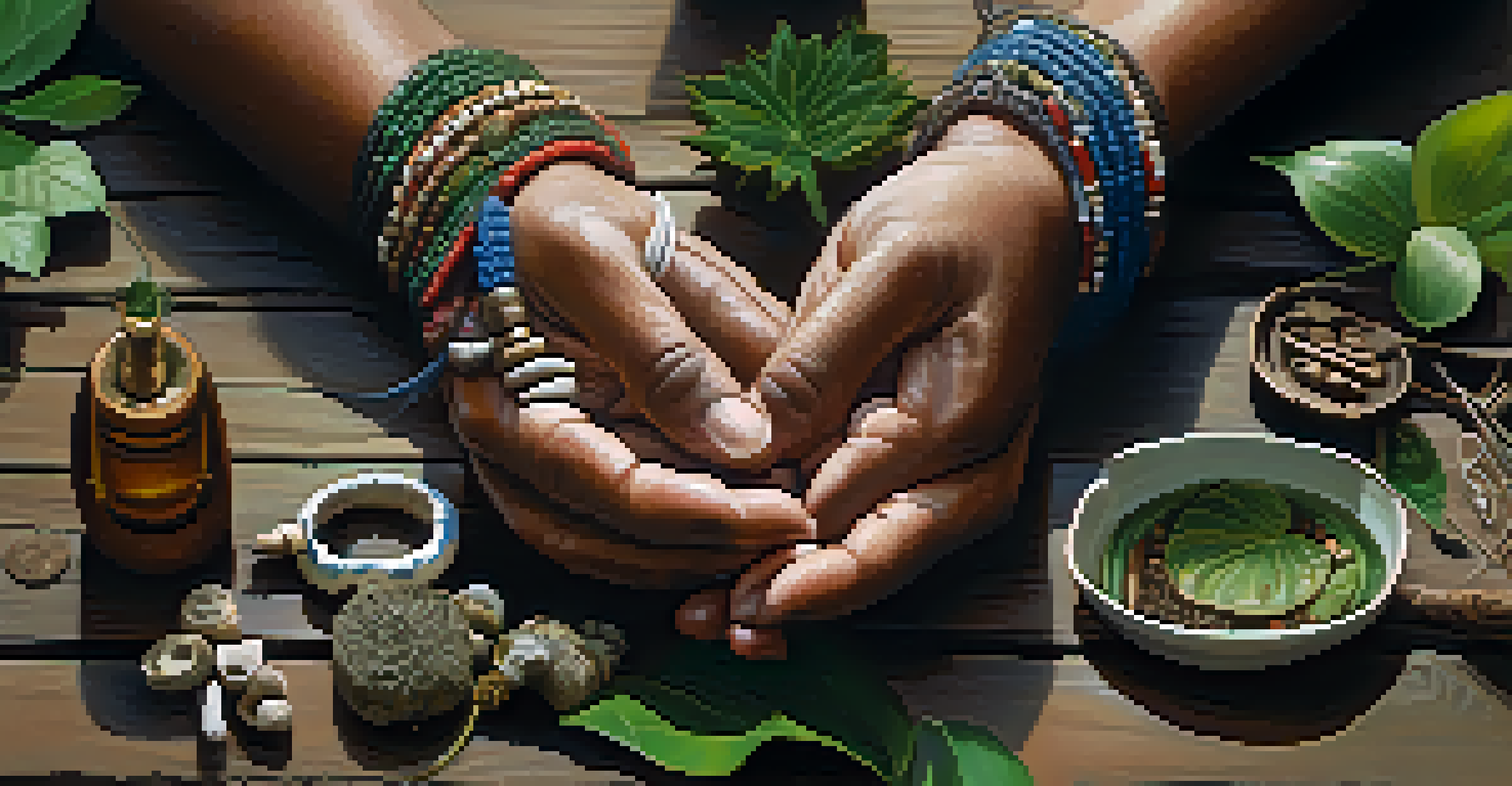Exploring Ayahuasca's Role in Indigenous Healing Traditions

Understanding Ayahuasca and Its Cultural Significance
Ayahuasca is a powerful brew made from the Banisteriopsis caapi vine and other plants, traditionally used by Indigenous tribes in the Amazon. Its significance extends beyond mere consumption; it is a profound spiritual and healing tool that connects participants to their ancestors and the spirit world. For many Indigenous communities, Ayahuasca ceremonies are sacred rituals that embody their cultural identity and values.
The plant is a teacher and a guide, showing us the way to heal ourselves.
The use of Ayahuasca dates back thousands of years, with its roots deeply embedded in the spiritual practices of Amazonian cultures. Shamans, or healers, guide participants through these ceremonies, often using songs, chants, and rituals to create a safe space for healing and discovery. This connection to tradition not only enhances the experience but also reinforces the community's shared beliefs and practices.
As Western interest in Ayahuasca grows, it’s crucial to recognize and respect its Indigenous origins. Misappropriating this sacred plant for commercial gain risks diluting its cultural significance and undermining the traditions of those who have used it for generations. Therefore, understanding its cultural context is key to appreciating its role in Indigenous healing.
The Healing Properties of Ayahuasca
Ayahuasca is known for its potential to facilitate deep emotional and psychological healing. Many participants report experiencing profound insights during ceremonies, often confronting past traumas and uncovering hidden emotions. This process can lead to significant personal transformation, providing clarity and catharsis that conventional therapies may not achieve.

The brew contains DMT (dimethyltryptamine), a powerful psychoactive compound that alters perception and consciousness. In a safe and guided environment, users may encounter visions or spiritual experiences that allow them to access parts of their psyche that are usually hidden. This journey can be both challenging and enlightening, allowing individuals to develop a deeper understanding of themselves.
Cultural Significance of Ayahuasca
Ayahuasca serves as a sacred spiritual and healing tool for Indigenous communities, deeply rooted in their cultural practices.
Moreover, Ayahuasca has been linked to physical healing as well. Many users report improvements in conditions such as depression, anxiety, and addiction following their experiences. This holistic approach to health—addressing both mind and body—aligns with Indigenous beliefs about wellness, emphasizing the interconnectedness of all aspects of life.
The Role of Shamans in Ayahuasca Ceremonies
Shamans play a crucial role in Ayahuasca ceremonies, acting as guides and facilitators for participants. Their extensive knowledge of the plants and spiritual practices ensures that the ceremonies are conducted safely and effectively. These healers often undergo years of training, learning the intricacies of the brew and its effects on the mind and spirit.
Ayahuasca is a medicine that helps us realize that we are not alone, we are all connected.
During a ceremony, the shaman creates a sacred space, invoking the spirits of the plants and ancestors to assist in the healing process. They use traditional songs, known as icaros, to help guide participants on their journeys. This musical element is not just for ambiance; it serves as a vital tool for navigation through the often tumultuous emotional landscapes that arise during the experience.
By fostering an environment of trust and safety, shamans enable participants to surrender to the experience, facilitating deeper healing. Their presence is a reminder of the importance of community and shared spirituality in Indigenous cultures, reinforcing that healing is not just an individual journey but a communal one.
Ayahuasca and Spiritual Awakening
For many, Ayahuasca is not just a healing tool but also a catalyst for spiritual awakening. Participants often report experiencing heightened states of awareness, feelings of interconnectedness, and profound revelations about their purpose in life. This sense of awakening can lead to lasting changes in perspective and behavior, encouraging individuals to live more authentically.
The spiritual experiences induced by Ayahuasca can vary widely, from feelings of love and unity to confronting one's fears and doubts. These journeys often challenge participants to look beyond their everyday lives, helping them realize the broader implications of their actions and relationships. This shift in consciousness can be life-altering, inspiring individuals to pursue paths that align more closely with their true selves.
Healing Benefits of Ayahuasca
Participants often experience profound emotional and psychological healing, confronting traumas and gaining insights that traditional therapies may miss.
Indigenous cultures emphasize the importance of maintaining a connection to the spiritual realm, and Ayahuasca serves as a bridge to that world. Through this connection, participants often find guidance and support from spirits or ancestors, further enriching their experiences and reinforcing their spiritual beliefs.
The Ethical Considerations of Ayahuasca Use
As interest in Ayahuasca spreads globally, ethical considerations come to the forefront. The commercialization of Ayahuasca retreats can lead to exploitation of Indigenous knowledge and practices, raising concerns about cultural appropriation. It's essential to approach Ayahuasca with respect and understanding, recognizing its roots and the people who have preserved its traditions.
Participants should seek out authentic experiences led by knowledgeable shamans who honor the cultural significance of the practice. Researching the backgrounds of facilitators and the organizations hosting ceremonies can help ensure that the experience is respectful and aligned with Indigenous values. This approach not only honors the traditions but also contributes to the sustainability of these practices.
Moreover, ethical considerations extend to the well-being of participants. Ensuring that individuals are adequately prepared for the psychological and emotional challenges of an Ayahuasca journey is crucial. This preparation helps foster a safe environment where healing can occur, and participants can navigate their experiences responsibly.
Cultural Preservation and Ayahuasca
The rise in popularity of Ayahuasca has sparked conversations about cultural preservation. As more people seek out Ayahuasca experiences, there is a growing need to protect the traditions of Indigenous communities that have long relied on this sacred plant. Ensuring that these practices are respected and maintained is vital for their survival.
Many Indigenous groups are now taking proactive steps to safeguard their knowledge and practices, often advocating for greater recognition of their rights and cultural heritage. By sharing their experiences and teachings, they aim to educate outsiders about the importance of Ayahuasca in their healing traditions. This exchange can foster greater understanding and respect for Indigenous cultures.
Ethics in Ayahuasca Practices
Respecting Indigenous traditions and ensuring responsible use are crucial as Ayahuasca's popularity grows globally.
Additionally, supporting Indigenous-led initiatives and organizations can help ensure that the benefits of Ayahuasca are shared equitably. By prioritizing the voices of Indigenous peoples, we can contribute to the preservation of their cultural practices while promoting responsible tourism and ethical engagement with Ayahuasca.
The Future of Ayahuasca in Healing Practices
As Ayahuasca continues to gain attention in Western wellness circles, its future in healing practices looks promising yet complex. The blending of traditional Indigenous wisdom with modern therapeutic approaches offers exciting possibilities for holistic healing. However, it also presents challenges in maintaining the integrity of these practices.
Future research into the therapeutic benefits of Ayahuasca could lead to broader acceptance within the mental health community. By studying its effects in clinical settings, practitioners may develop a deeper understanding of how Ayahuasca can complement conventional therapies. This integration could help bridge the gap between Indigenous and Western healing practices.

Ultimately, the future of Ayahuasca relies on a collective effort to honor its origins while exploring its potential. By fostering respectful relationships between Indigenous communities and those seeking healing, we can ensure that Ayahuasca remains a powerful tool for transformation, rooted in cultural significance and ethical practice.